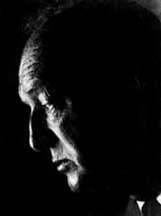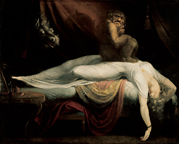 - Vladimir
Nabokov
-
- Born: 23
April 1899; St Petersburg, Russia
- Father holds
post in post-Revolution provisional govt -
1917
- London -
1919
- Cambridge
(studies French, German) - 1920-22
- Father
assassinated in Berlin - 1922
- Germany -
1922-37
- Translates
Alice
in Wonderland
to Russian - 1923
- Marries
Véra Slonim - 1925
- 1st novel,
Mary - 1925
- Birth of son,
Dimitry - 1934
- Paris,
meets James
Joyce - 1937
- United States
- 1940
- Lepidopteral
studies at Mus of Nat Hist, NY - 1940
- Meets
Edmund Wilson -
1940
- Book
on Gogol - 1944
- Teaches at
Cornell - 1948-58
- U S citizen -
1945
- Translates
A
Hero of Our Time
- 1958
- Switzerland -
1959
- Translates
Eugene
Onegin
- 1964
- Dies: 2 July
1977; Montreux, Switzerland
King,
Queen, Knave - 1928
Despair
- 1934
Invitation
to a Beheading - 1935
The
Gift - 1937
Laughter
in the Dark - 1938
The Real
Life of Sebastian Knight - 1941
Bend
Sinister - 1947
Lolita
- 1955
Pnin -
1957
Nabokov's
Dozen - 1958
Pale
Fire - 1962
Speak
Memory - 1967
Ada -
1969
Transparent
Things - 1972
Look at
the Harlequins - 1974
- Nabokov plays
with his readers by sabotaging their conventional
expectations. Thus characters like Luzhin and Krug appear
at times to be the sort of figures of whom we would
normally approve; but at other times they seem repugnant.
Also the obsession with patterning, the observation of
detail, and the self-consciousness of language, are all
ways of shifting attention from the humdrum contingencies
of the outside world, and directing the reader inwards to
the magical artifice that is the novel.
- - Mark
Lilly
-
- He could
swear he did not look back, could not - by any optical
chance, or in any prism - have seen her physically as he
walked away; and yet, with dreadful distinction, he
retained forever a composite picture of her standing
where he left her. The picture - which penetrated him,
through an eye in the back of his head, through his
vitreous spinal canal, and could never be lived down,
never - consisted of a selection and blend of such random
images and expressions of hers that had affected him with
a pang of intolerable remorse at various moments in the
past.
Ada

|

